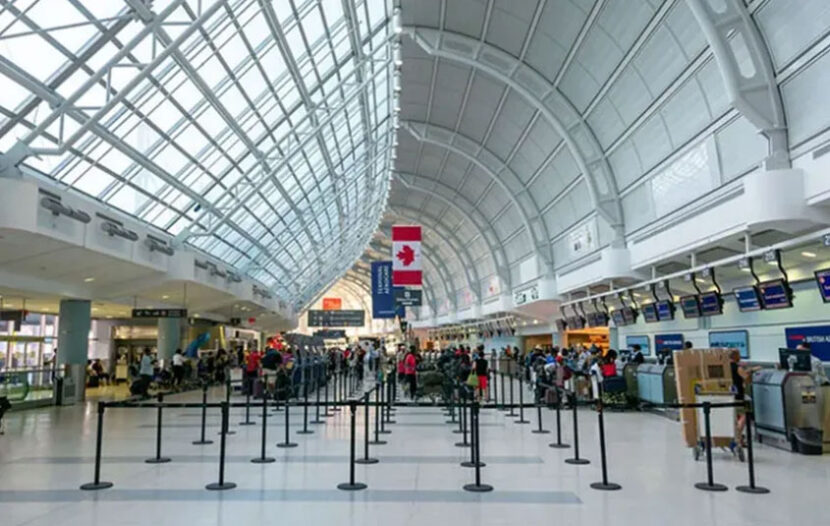OTTAWA — Canada’s ongoing labour shortage, a direct result of the COVID-19 pandemic, fuelled much of the chaos at Canada’s overwhelmed airports this spring and summer, Transport Minister Omar Alghabra told the House of Commons transport committee on Friday.
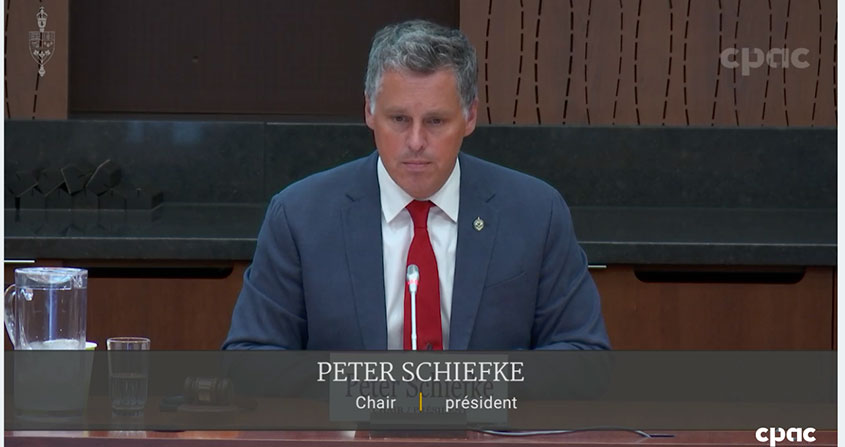
Transport Committee chair, MP Peter Schiefke
In the first of a series of hearings into the turbulent air travel experience coming out of the pandemic, Minister Alghabra also cited delays at airports around the world amid tourism’s rapid restart, noting that air travel upheaval over the past several months was in no way a uniquely Canadian problem.
And despite calls for the elimination of the ArriveCAN requirement – with many arguing that it has outlived its usefulness – Minister Alghabra said delays for arriving passengers would be even worse without ArriveCAN.
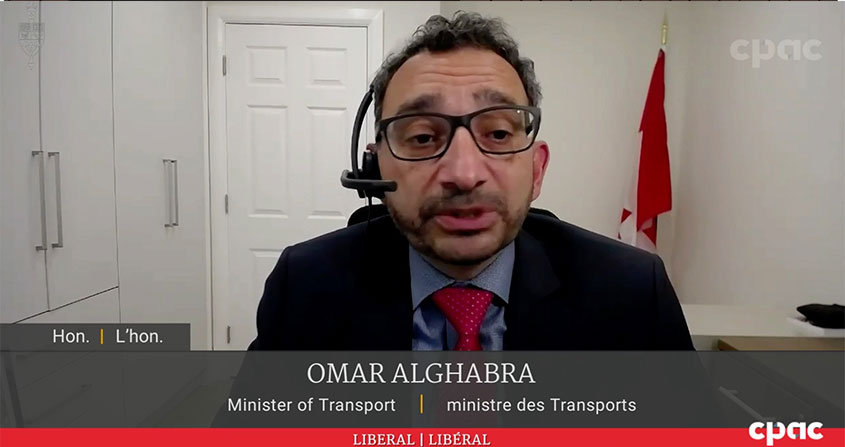
Transport Minister Omar Alghabra
Minister Alghabra fielded questions from Liberal, Conservative and NDP MPs for the first half of the hearing. The second half included testimony from officials with CATSA, CBSA and more.
TIMING IS EVERYTHING
There aren’t many people – and certainly very few in the travel industry – who thought this first look at Canada’s airport delays and cancellations would shed any great light on solutions to air travel’s challenges coming out of the pandemic.
But after watching the first hearing – held in late afternoon on a Friday in August, no less – often dissolve into political posturing, particularly during the Q&A session with MPs, you have to wonder just how committed any of the federal parties are to finding solutions to Canada’s rocky travel restart, and to make sure it doesn’t happen again, especially heading into the busy winter sun travel season.
Minister Alghabra provided an update on the progress made, while acknowledging “that there is still work to be done.”
After the aviation sector lost almost 90% of its business and faced significant layoffs, came a massive surge in demand for air travel. “252%: this is the increase in daily passenger volumes between January and August 2022 in Canada. By comparison, in the US. the increase was 64%,” he said.
“That’s not an excuse. It’s a fact,” he added.
And while air travel involves many stakeholders, including the airlines and the airports, “from day 1 we decided to focus on action rather than blame,” he said. “All Canadians rightly expect their government to do everything it can to address congestion causes and work with partners to implement solutions. We took action from the beginning and we will continue to do so.”
Those actions include hiring more than 1,700 CATSA officers in recent months. According to the latest stats, 87% of passengers departing from Canada’s four largest airports were screened by CATSA within 15 minutes. That’s up from 63% since the first week of May. He also notes that random testing for arriving passengers, back in effect since July 19 after a brief pause, is now done outside of airports.
Minister Alghabra also noted that the Liberal government brought in the Airline Passenger Protection Regulations (APPR) in 2017, and effective Sept. 8, 2022, broader rules for Canada’s APPR will come into effect, “to ensure passengers are compensated for flight delays, cancellations, and other incidents that may be out of an air carrier’s control,” according to Transport Canada.
He also pointed out that the federal government has given the CTA extra funding to the tune of $11 million to help it process the backlog of complaints and requests for compensation from the airlines.
“I want Canadians to know that their government has been actively working to address airport congestion … we are seeing encouraging results but there’s still more work to be done,” said Alghabra.
“YES OR NO?”
Heading into the Q&A session, Alghabra had some fighting words: “There are those who have a vested interest in embellishing reality and undermining confidence in our airlines, and are only out to score political points. Our government on the other hand is focusing on tackling the real issue and is working with partners to do everything possible to reduce delays. That’s what we did and that’s what we will continue to do.”
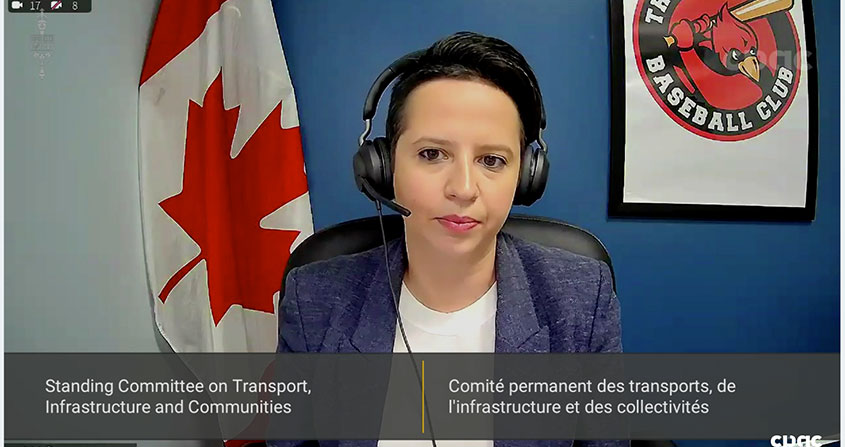
MP Melissa Lantsman
Kicking off the Q&As, MP Melissa Lantsman asked Alghabra if the government bears any responsibility for the chaos at Canada’s airports over the past many months, “yes or no?”.
Minister Alghabra said the pandemic and its resulting labour shortage were at the root of the problems. “I blame it on COVID,” he said.
Lantsman and others also questioned ArriveCAN’s effectiveness and usefulness at this point in the pandemic.
“ArriveCAN is not contributing to the congestion,” answered Alghabra. If there was no standardized means of ticking the COVID-19 requirements for travellers, congestion would be worse, he added. “ArriveCAN enables travellers to provide verification of their vaccination status electronically. Without it we would be adding several minutes per passenger at the border.”
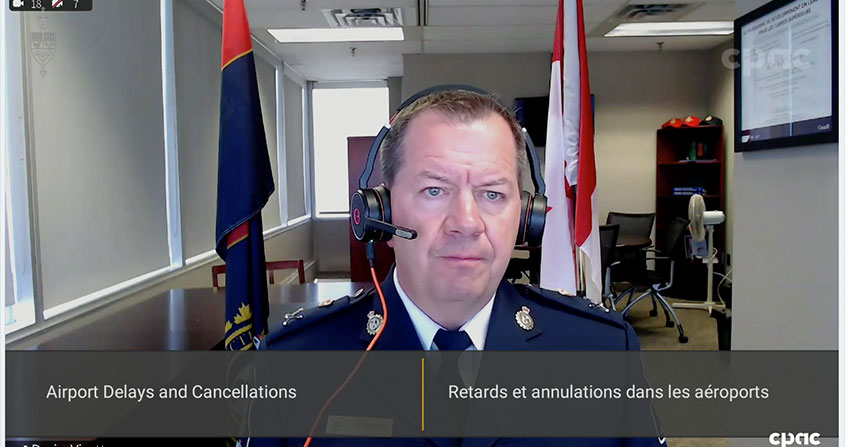
Denis Vinette, Canada Border Services Agency
Later in the hearing, the CBSA’s Denis Vinette backed up Minister Alghabra on ArriveCAN. Without it, said Vinette, “it would take far greater time to process individuals than it currently takes. It’s been a very efficient tool to allow for the capture of that public health information.”
IT’S THE LABOUR SHORTAGE, BUT …
Canada’s labour shortage is the biggest factor contributing to airport congestion, he stressed. “As I’ve been saying consistently since May, the labour shortage has been the root cause of the congestion at the airports,” he said, adding “this is not unique to Canada.”
Certainly the labour shortage coming out of the pandemic has been an issue worldwide, and airports including Heathrow and others in Europe had similar scenes of long lineups and chaos in the spring and early summer, just like Pearson and others.
But then the UK’s CAA and CMA stepped in and told Heathrow’s airport authority, in no uncertain terms: ‘fix it’. So in mid-July Heathrow capped daily passenger volumes at 100,000. It recently said the cap is working and has extended it to Oct. 29.
As aviation expert John Gradek told Travelweek last week, in Canada “there was never a hammer” when it came to cracking down on the number of flights.
“SHAMEFUL” AND “ATROCIOUS” TREATMENT OF PASSENGERS
Minister Alghabra was also questioned about the CTA and the processing of claims for compensation from the airlines from frustrated travellers facing delays or cancellations.
MP Taylor Bachrach asked Alghabra about the “shameful” and “atrocious” treatment of air travel passengers in the past several months, from passengers with cancelled flights handed yoga mats to sleep on the airport floor, to questions about refund policies after reports that crew constraints were being used to reject compensation requests, on the basis that crew shortages are a safety issue.
These are certainly issues for the airlines, who will reportedly also provide testimony at these hearings. They’re also issues for the CTA, currently working its way through a backlog of thousands of air traveller complaints.
Said Alghabra: “I’m confident the CTA will do everything it can… and hold airlines to their end of the bargain. Clearly there have been examples of [airline response] that were unacceptable and should not be tolerated.”
As reported last week, Air Canada spokesperson Peter Fitzpatrick told Travelweek that Air Canada remains committed to continue fulfilling its obligations under APPR.
Fitzpatrick added: “In response to suggestions by some industry observers [that] airlines may be misapplying APPR, it should be noted the CTA undertook an extensive study of airline handling of APPR cases. It found: ‘There was no evidence gathered during the course of the inquiry that suggests that the respondent air carriers deliberately mischaracterized flight disruptions or miscommunicated to passengers with the purpose of relieving themselves of their obligations towards passengers’.”
On Friday, Alghabra said he didn’t want to pre-judge individual claims now in the hands of the CTA. “But I don’t feel that labour issues can be used” to reject compensation claims, he said.
This first hearing was the first in a series, with more on the way for the coming weeks.
